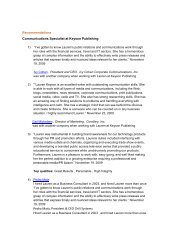Telecomm Analyst: Comarco's Thomas Franza - Keyson Publishing
Telecomm Analyst: Comarco's Thomas Franza - Keyson Publishing
Telecomm Analyst: Comarco's Thomas Franza - Keyson Publishing
Create successful ePaper yourself
Turn your PDF publications into a flip-book with our unique Google optimized e-Paper software.
The <strong>Telecomm</strong> <strong>Analyst</strong><br />
or “botching” the job, especially if it is<br />
assigned by a person in authority.<br />
A good example would be a manager giving a<br />
subordinate a report that is due to be completed<br />
the following week. The day arrives and<br />
the subordinate has not finished the report.<br />
Instead of the employee pointing out in<br />
advance of that day that he has not completed the report or that<br />
he needs more time, he fabricates some excuse or loses or misplaces<br />
the report.<br />
To add to the employer’s frustration, these individuals feel<br />
cheated, unappreciated and misunderstood. They are blamers<br />
who usually bring down morale in the workplace (and at home<br />
too!) with their sullen, irritable, negativistic and cynical behavior.<br />
They grumble and mumble. It’s common to hear such phrases<br />
from them as “It doesn’t pay to work too hard,” and “Good<br />
things don’t last.” Their attitude usually evokes negative and<br />
hostile responses from others.<br />
However, underlying their defeatist attitude is a lack of selfconfidence,<br />
which is hidden by their superficial bravado. Their<br />
lack of self-confidence contributes to their withholding and<br />
indecisiveness. This is particularly seen in work situations,<br />
where these people feel that their assertive responses would not<br />
be tolerated. Therefore, they usually do not actively engage in<br />
confrontation, but inside they are boiling cauldrons of simmering<br />
hostility that occasionally boil over. Perhaps you’ve been<br />
around these people who slam doors and drawers, and when<br />
asked “What’s wrong” they typically answer, “Nothing.”<br />
Another person would ask, “Is everything all right” and they<br />
answer, “Everything is fine.”<br />
These are passive-aggressive responses for what they really feel,<br />
which is frustrated, furious and insecure. The biggest gun in<br />
their armory of responses is silence. Silence is a tool that they<br />
have learned to keep their aggression under wraps.<br />
Know anybody who fits this description<br />
SOLUTIONS:<br />
1. Don’t lose your temper with someone like this. You can<br />
count on losing. Silence is one of their important weapons.<br />
You need to remain calm, objective and relaxed in their<br />
presence. Remember that passive-aggressive behavior is<br />
immature, regressive and provocative.<br />
2. Get them to set clear goals and limits. Nothing should be<br />
left unclear or vague. The best way to encourage them to<br />
set goals and commit to an end result is to ask questions<br />
that can’t be answered with yes or no answers. We suggest<br />
that you use questions that begin with who, what, where,<br />
when and how. For example, “How do you want to proceed”<br />
“Where shall we go from here” These are called<br />
open-ended questions. Place the ball in their court.<br />
3. Get commitments from them and have them write them<br />
down for you. Keep the ball in their court.<br />
4. Don’t make promises to them that you can’t keep. Be<br />
upfront.<br />
5. Praise their successes publicly. Criticize their failures privately.<br />
6. As a last resort, impart negative consequences. Write them<br />
up; initiate a grievance procedure; go over their heads to a<br />
higher up. Dismissal is a final action.<br />
Good luck. This is going to take a lot of your talent and expertise.<br />
Letters To the Editors<br />
Ericsson Located<br />
Somewhere In Europe<br />
Konstantine Sofer writes: I hate to be<br />
such a stickler for geographic accuracy,<br />
but the [the Feb. 6 Upgrades & Downgrades] reeks of geographic<br />
ignorance. ERICSSON (ERICY), let it be known, is a<br />
Swedish company, not a Finnish one, although Finland, to my<br />
recollection, has two official languages—Finnish and<br />
Swedish—and 6% of its population are ethnic Swedes. Still, the<br />
company in question is based in Stockholm.m.<br />
Stng8035@aol.com writes: Are you sure ERICSSON is<br />
a Finnish company And if you are not, what else<br />
in your reports is wrong I hope this was a mis -<br />
take...<br />
Spiral1@aol.com writes: ERICSSON is<br />
a Swedish company, not Finnish —- just<br />
like [GENERAL ELECTRIC (GE)] is a<br />
U.S. company, not Canadian.<br />
by multex.com<br />
10



